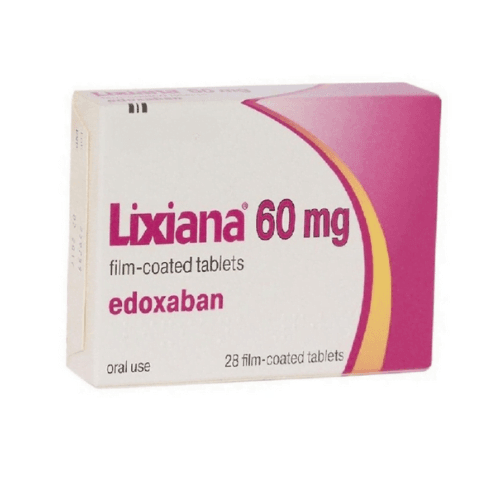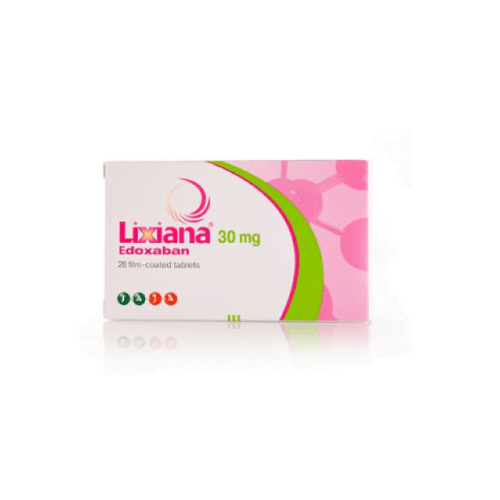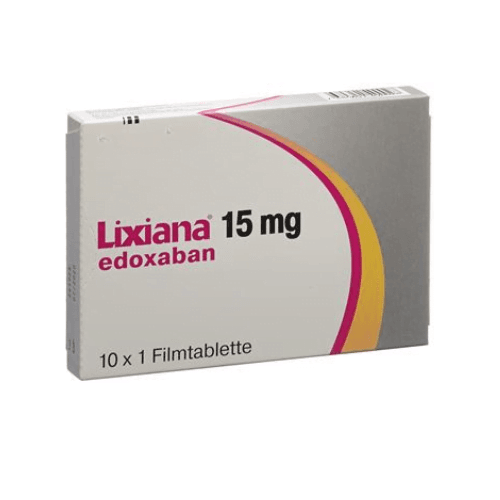Shipping with this method takes 3-5 days
Lixiana® Tablets for Atrial Fibrillation and Blood Clots
$145.99
Secure Encrypted Payments
Lixiana is a prescription anticoagulant that helps reduce the chance of harmful clots. It is used to prevent stroke in certain adults with nonvalvular atrial fibrillation and to treat deep vein thrombosis or pulmonary embolism after initial heparin. This page explains how it works, key safety points, and how to access it if paying without insurance.
What Lixiana Is and How It Works
US delivery from Canada is available through our pharmacy model for eligible prescriptions. Lixiana® contains edoxaban, a direct Factor Xa inhibitor. It decreases the activity of Factor Xa, which reduces thrombin generation and clot formation. This medicine does not dissolve existing clots; it helps prevent clots from growing and new clots from forming while your body breaks them down. YouDrugstore is a licensed Canadian pharmacy in Manitoba. Pharmacists review prescriptions before dispensing.
In nonvalvular atrial fibrillation, this treatment lowers the risk of stroke and systemic embolism. For deep vein thrombosis or pulmonary embolism, it is started after several days of a parenteral anticoagulant, such as heparin. It can be taken with or without food. Only take it under the guidance of your prescriber and as described in the official label.
You can read more about clot prevention and related therapies in our articles on Types Of Anticoagulant and How Anticoagulant Drugs. For condition overviews, see Atrial Fibrillation and Blood Clot DVT PE. Explore related treatments under Cardiovascular.
Who It’s For
This therapy is indicated for adults with nonvalvular atrial fibrillation to reduce the risk of stroke and systemic embolism. It is also indicated to treat DVT and PE after an initial course of a parenteral anticoagulant. People with active pathological bleeding should not use it. Those with mechanical heart valves or moderate to severe hepatic disease with coagulopathy should avoid it. Kidney function, body weight, and certain interacting medicines may guide dose selection.
In some regions, reduced effectiveness has been observed in atrial fibrillation patients with very high renal function; clinicians may consider this when selecting therapy. Always follow your prescriber’s advice and the product monograph.
Dosage and Usage
Typical dosing for atrial fibrillation is once daily, taken at the same time each day. For DVT or PE, start after at least 5 to 10 days of a parenteral anticoagulant, then continue once daily. Your prescriber may choose a lower daily dose if you have impaired renal function, lower body weight, or are taking certain P‑gp inhibitors.
Swallow the tablet with water. It may be taken with or without food. Try to build a daily routine to support adherence, such as linking the dose to a regular activity. Do not stop this medicine without medical guidance, since suddenly stopping can increase the risk of clotting. If you are uncertain about administration options, review the Patient Information in the official label.
Strengths and Forms
Tablets are commonly available in 15 mg, 30 mg, and 60 mg strengths. Packaging and appearance can vary by manufacturer and lot. Availability of certain strengths may differ by pharmacy and over time.
Missed Dose and Timing
If you miss a dose, take it as soon as you remember on the same day, then take your next dose at the usual time. Do not take two doses at once to make up for a missed dose. If you are unsure what to do, contact your pharmacist or prescriber for advice consistent with the official label.
Storage and Travel Basics
Store tablets at room temperature in a dry place away from excess heat and moisture. Keep them in the original packaging until use to protect from humidity and mix-ups. Always keep medicines out of reach of children and pets. When traveling, bring enough tablets for the entire trip plus a few extra, carry them in your hand luggage, and keep a copy of your prescription and a medication list. If flying, a simple note or pill label can help with security screening. Dispose of unused or expired tablets according to local guidance; your pharmacist can advise.
Benefits
As a once-daily direct Factor Xa inhibitor, this therapy provides steady anticoagulant effect without routine INR monitoring. Fewer food interactions compared with vitamin K antagonists can simplify meal planning. The oral tablet format supports consistent use in everyday life.
To learn how different anticoagulants compare by class and use cases, review Pradaxa Vs Eliquis and Xarelto 20 Mg.
Side Effects and Safety
- Bleeding, bruising, or nosebleeds
- Gum bleeding or prolonged bleeding from cuts
- Gastrointestinal upset, indigestion, or nausea
- Anemia symptoms such as fatigue or pallor
- Headache or dizziness
- Skin rash or itching
Serious bleeding can occur, including gastrointestinal or intracranial bleeding. Seek urgent help for unusual pain, swelling, fainting, vomiting blood, black stools, or severe headache. There is a risk of spinal or epidural hematoma with neuraxial anesthesia or spinal puncture. Tell your healthcare professional about all procedures, injections, or surgeries in advance. Liver-related adverse effects are uncommon but possible; report yellowing of the skin or eyes or dark urine.
Drug Interactions and Cautions
Strong P‑gp inducers such as rifampin or St. John’s wort can reduce effectiveness. P‑gp inhibitors including dronedarone, amiodarone, verapamil, or certain macrolides may increase exposure; dose selection may change based on your clinical profile. Use caution with antiplatelets, NSAIDs, SSRIs, and SNRIs due to bleeding risk. Avoid concurrent use with other anticoagulants unless supervised during transitions. Alcohol can increase bleeding risk; discuss safe limits with your prescriber.
For related medicines, see Amiodarone and Diltiazem. For background on traditional therapy, read Warfarin Uses.
What to Expect Over Time
The anticoagulant effect begins soon after dosing and remains steady with consistent daily use. You may not feel any different day to day. The goal is prevention, so measuring success often means avoiding clot-related events. Keep up with appointments and lab checks your prescriber orders, especially if you have kidney or liver considerations. Build habits that support on-time dosing, such as calendar reminders. Some patients plan for Lixiana price as part of long-term therapy budgeting, including refill timing and travel.
Compare With Alternatives
Other direct oral anticoagulants include rivaroxaban and apixaban. Traditional vitamin K antagonists such as warfarin remain options for certain patients, especially with mechanical valves or specific clinical scenarios. If your clinician recommends a same‑molecule alternative, see Edoxaban. For legacy therapy that requires INR monitoring, see Warfarin. Ask your prescriber about a Lixiana cost comparison versus other therapies, considering dosing, monitoring needs, and your medical history.
Pricing and Access
Canadian pricing can be helpful for many patients. Check the product page to see your current options and to upload a valid prescription. If you are comparing values, you may want to look at Lixiana cash price for your selected strength and quantity. Checkout is encrypted for your privacy. You can also review Lixiana online price alongside alternatives and discuss what fits your plan. We offer US shipping from Canada with clear steps for placing your order once your prescription is verified.
Availability and Substitutions
Supply can vary by strength and pack size. If this brand is temporarily unavailable, your prescriber may recommend a clinically appropriate alternative or a different pack size. Ask about edoxaban generic price if a substitute is suitable where you live. Do not switch products without guidance from your clinician.
Patient Suitability and Cost-Saving Tips
This treatment may suit adults with nonvalvular atrial fibrillation or DVT/PE after initial heparin therapy, when no contraindications exist. It may not be appropriate if you have active bleeding, certain liver conditions, or are using interacting medicines that cannot be adjusted. Kidney function and body weight can influence dosing choices. For savings, consider multi‑month fills if approved, use refill reminders to avoid gaps, and compare Canadian options. Discuss Lixiana cost without insurance with your prescriber and pharmacist to plan a sustainable approach.
Questions to Ask Your Clinician
- Is this anticoagulant appropriate for my specific stroke or clot risk?
- How do my kidneys, liver, and weight affect my dose choice?
- Which medicines or supplements should I stop or adjust before starting?
- What signs of bleeding require urgent attention, and whom should I call?
- How should I manage this medicine around dental work or surgery?
- What is the plan if I need to transition from or to another anticoagulant?
Authoritative Sources
- Lixiana Product Monograph (Daiichi Sankyo)
- Health Canada Drug Product Database: Lixiana
- FDA DailyMed: Savaysa (edoxaban)
Ready to order? Place your prescription with YouDrugstore for secure checkout and prompt US shipping from Canada, with temperature-controlled handling when required. This overview does not replace your prescriber’s advice or the official label.
Express Shipping - from $25.00
Prices:
- Dry-Packed Products $25.00
- Cold-Packed Products $35.00
Shipping Countries:
- United States (all contiguous states**)
- Worldwide (excludes some countries***)
Standard Shipping - $15.00
Shipping with this method takes 5-10 days
Prices:
- Dry-Packed Products $15.00
- Not available for Cold-Packed products
Shipping Countries:
- United States (all contiguous states**)
- Worldwide (excludes some countries***)
How long do I need to take this anticoagulant?
Duration depends on your condition and risk profile. In atrial fibrillation, therapy is often long term to reduce stroke risk. For DVT or PE, treatment usually continues for months after an initial heparin course, and sometimes longer to prevent recurrence. Your prescriber will weigh bleeding risk against clot risk and review the plan at regular visits. Do not stop this medicine on your own, as doing so can increase the chance of a clot.
Can I crush or split the tablets?
Swallow tablets whole unless your prescriber or the official label provides alternative instructions. Some anticoagulants may be administered differently under specific circumstances, but changes in administration can affect absorption. If you have difficulty swallowing, ask your pharmacist about options that align with the product monograph. Never alter how you take a dose without professional guidance.
What if I need surgery or dental work while taking it?
Tell your healthcare professional about this medicine before any procedure. For many minor dental procedures, adjustments may be minimal, but decisions depend on bleeding risk and your clotting risk. Your prescriber will provide a plan for stopping and restarting if needed. Do not make changes on your own. For neuraxial procedures, special precautions apply because of spinal or epidural hematoma risk.
Do I need regular blood tests with this therapy?
Routine INR monitoring is not required with direct Factor Xa inhibitors. Your clinician may still order periodic blood work to check kidney and liver function, and to assess overall safety. If your clinical situation changes, additional tests may be recommended. Keep all appointments and report any bleeding signs promptly. Lab plans vary, so follow the advice in your care plan and the official label.
What medicines or supplements should I avoid?
Avoid combining with other anticoagulants unless supervised during transitions. Use caution with NSAIDs, antiplatelet agents, SSRIs, and SNRIs due to bleeding risk. Strong P‑gp inducers like rifampin or St. John’s wort can reduce effectiveness, while certain inhibitors can increase exposure. Always review new prescriptions, over‑the‑counter products, and herbal supplements with your pharmacist or prescriber.
Is it safe to drink alcohol while taking this medicine?
Alcohol can increase bleeding risk and may interact with other medicines you take. If you drink, discuss safe limits with your prescriber. Avoid binge drinking, and report any signs of bleeding such as dark stools, prolonged nosebleeds, or unusual bruising. Staying within your care plan helps reduce complications and keeps your therapy on track.
What should I do if I miss a dose?
Take the missed dose as soon as you remember on the same day, then take your next dose at the regular time. Do not double up the next day to make up for a missed dose. If you are uncertain how to handle repeated missed doses, contact your pharmacist or prescriber for guidance that aligns with the product labeling.



